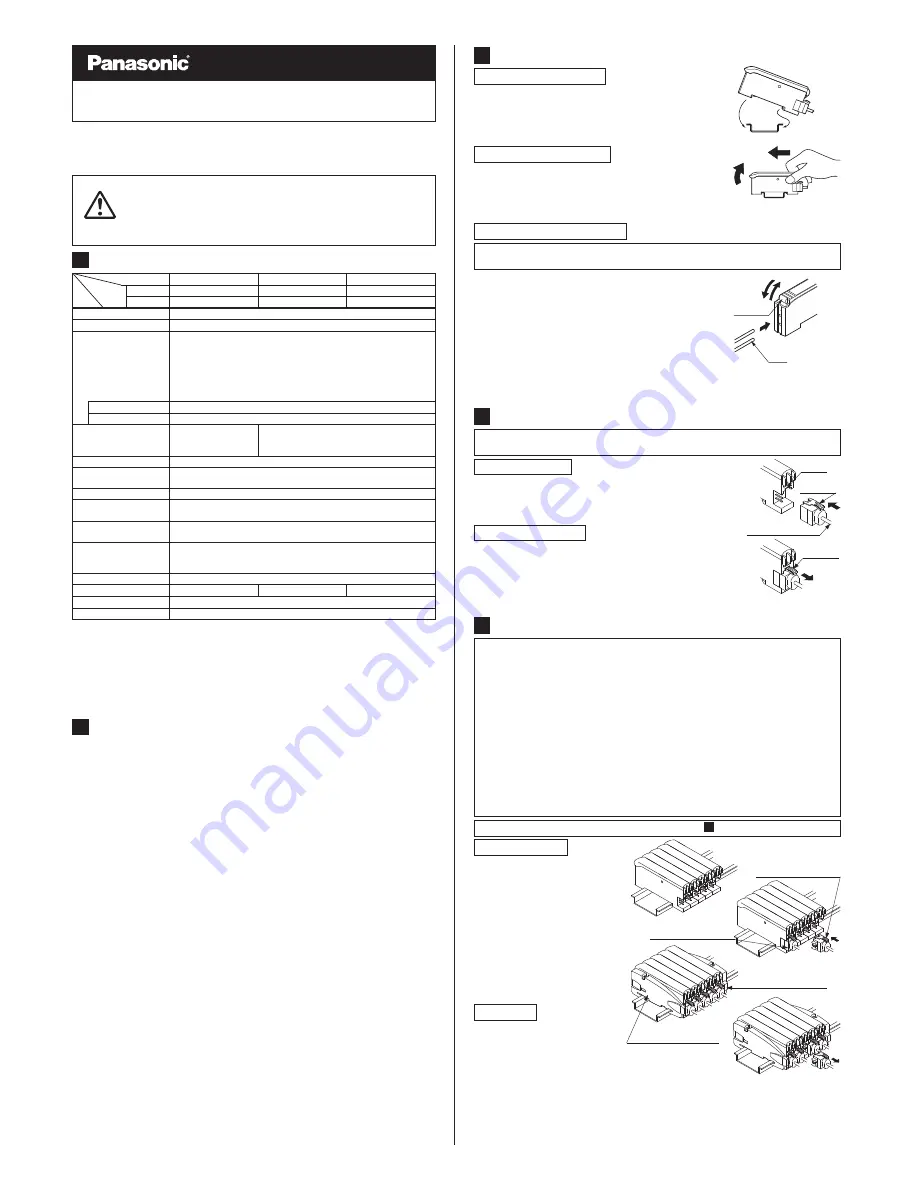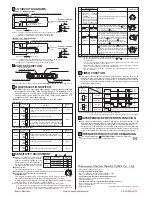
CAUTIONS
2
●
●
●
●
●
●
●
●
●
●
●
●
●
●
●
This product has been developed / produced for industrial use only.
Make sure that the power supply is off while wiring.
Verify that the supply voltage variation is within the rating.
Take care that if a voltage exceeding the rated range is applied, or if an AC power
supply is directly connected, the sensor may get burnt or damaged.
In case noise generating equipment (switching regulator, inverter motor, etc.) is
used in the vicinity of this product, connect the frame ground (F.G.) terminal of the
equipment to an actual ground.
If power is supplied from a commercial switching regulator, ensure that the frame
ground (F.G.) terminal of the power supply is connected to an actual ground.
Do not use during the initial transient time (0.5 sec.) after the power supply is
switched on.
Take care that short-circuit of the load or wrong wiring may burn or damage the
sensor.
Do not run the wires together with high-voltage lines or power lines or put them in
the same raceway. This can cause malfunction due to induction.
Make sure to use the optional quick-connection cable for the connection of the
amplifier. Extension up to total 100m is possible with 0.3mm
2
, or more, cable.
However, in order to reduce noise, make the wiring as short as possible.
This sensor is suitable for indoor use only.
Avoid dust, dirt, and steam.
Take care that the sensor does not come in contact with water, oil, grease, organic
solvents, such as, thinner etc., or strong acid, and alkaline.
This sensor cannot be used in an environment containing inflammable or
explosive gases.
Never disassemble or modify the sensor.
●
●
Never use this product as a sensing device for personnel
protection.
In case of using sensing devices for personnel protection, use
products which meet standards, such as OSHA, ANSI or IEC
etc., for personnel protection applicable in each region or
country.
WARNING
SPECIFICATIONS
1
840mW or less (current consumption 35mA or less at 24V supply voltage)
Power consumption
12 to 24V DC
±
10% Ripple P-P 10% or less
Supply voltage
Blue LED type
Green LED type
Type
Red LED type
PNP output
FX-311BP
FX-311GP
FX-311P
FX-311B
FX-311G
NPN output
Model
No.
FX-311
Item
Output
Selectable: 250
μ
s or
less (for S-D, STD),
2ms or less (for LONG)
Green LED (lights up under stable light-received condition or stable
dark condition)
Stability indicator
Selectable: 150
μ
s or less (for FAST),
250
μ
s or less (for STD), 2ms or less
(for LONG)
Response time
Orange LED (lights up when the output is ON)
Operation indicator
Incorporated
Short-circuit protection
Selectable either Light-ON or Dark-ON
Output operation
Timer function
Incorporated with OFF-delay timer, selectable either effective
(approx. 10ms or 40ms) or ineffective
12-turn potentiometer with indicator (Pointer part: red backlight) (Note 2)
Sensitivity adjuster
Incorporated (up to four fibers can be mounted adjacently)
Interference prevention
function
-10 to +55
℃
(If 4 to 7 units are connected in cascade: -10 to +50
℃
,
if 8 to 16 units are connected in cascade: -10 to +45
℃
)
(No dew condensation or icing allowed), Storage: -20 to +70
℃
Ambient temperature
Green LED (modulated)
Red LED (modulated) Blue LED (modulated)
Enclosure: Heat-resistant ABS, Transparent cover: Polycarbonate
Material
15g approx.
Weight
35 to 85% RH, Storage: 35 to 85% RH
Ambient humidity
Emitting element
<NPN output type>
NPN open-collector transistor
・
Maximum sink current: 100mA (Note 1)
・
Applied voltage: 30V DC or less
(between output and 0V)
・
Residual voltage: 1.5V or less
[at 100mA (Note 1) sink current]
<PNP output type>
PNP open-collector transistor
・
Maximum source current: 100mA (Note 1)
・
Applied voltage: 30V DC or less
(between output and +V)
・
Residual voltage: 1.5V or less
[at 100mA (Note 1) source current]
Notes: 1)
2)
3)
50mA if five, or more, amplifiers are connected together.
The red backlight of the pointer part lights up when the power is turned ON and when the
sensitivity is adjusted.
The cable for amplifier connection is not supplied as an accessory. Make sure to use the
optional quick-connection cables given below.
Main cable (3-core):
CN-73-C1
(cable length 1m),
CN-73-C2
(cable length 2m)
CN-73-C5
(cable length 5m)
Sub cable (1-core):
CN-71-C1
(cable length 1m),
CN-71-C2
(cable length 2m)
CN-71-C5
(cable length 5m)
MOUNTING
3
①
②
Fit the rear part of the mounting section of the amplifier
on a 35mm width DIN rail.
Press down the rear part of the mounting section of the
unit on the 35mm width DIN rail and fit the front part of
the mounting section to the DIN rail.
How to mount the amplifier
①
35mm width DIN rail
②
①
②
Push the amplifier forward.
Lift up the front part of the amplifier to remove it.
①
②
Take care that if the front part is lifted without pushing the
amplifier forward, the hook on the rear portion of the mounting
section is likely to break.
Note:
How to remove the amplifier
How to connect the fiber cables
①
②
③
Snap the fiber lock lever down.
Insert the fiber cables slowly into the inlets until they
stop. (Note 1)
Return the fiber lock lever to the original position, till it
stops.
Notes: 1)
2)
In case the fiber cables are not inserted to a position where
they stop, the sensing range reduces. In case of a flexible
fiber, take care that it may bend inside the amplifier, during
insertion.
With the coaxial reflective type fiber, such as,
FD-G4
or
FD-FM2
, insert the single-core fiber
cable into the beam-emitting inlet and the multi-core fiber cable into the beam-receiving
inlet. If they are inserted in reverse, the sensing accuracy will deteriorate.
①
②
③
Fiber
lock lever
Fiber
Be sure to fit the attachment to the fibers first before inserting the fibers to the
amplifier. For details, refer to the instruction manual enclosed with the fibers.
CONNECTION
4
Make sure that the power supply is off while connecting or disconnecting the
quick-connection cable.
①
②
Holding the connector of the quick-connection cable, align
its projection with the groove at the top portion of the
amplifier connector.
Insert the connector till a click is felt.
①
Pressing the projection at the top of the quick-connection
cable, pull out the connector.
Projection
Groove
Projection
Quick-connection cable
Connection method
Disconnection method
Take care that if the connector is pulled out without pressing the
projection, the projection may break. Do not use a
quick-connection cable whose projection has broken. Further, do
not pull by holding the cable, as this can cause a cable-break.
Note:
●
●
●
●
●
●
●
●
Make sure that the power supply is off while adding or removing the amplifiers.
Make sure to check the allowable ambient temperature, as it depends on the
number of amplifiers connected in cascade.
In case two, or more, amplifiers are connected in cascade, make sure to mount
them on a DIN rail.
When the amplifiers move on the DIN rail depending on the attaching condition,
fitting them between the optional end plates (
MS-DIN-E
) mounted at the two ends.
When connecting in cascade, mount the amplifiers close to each other, fitting them
between the optional end plates (
MS-DIN-E
) mounted at the two ends.
Up to maximum 15 amplifiers can be added (total 16 amplifiers connected in cascade.)
When connecting more than two amplifiers in cascade, use the sub cable (
CN-71-C
□
)
as the quick-connection cable for the second amplifier onwards.
The settings other than the interference prevention function cannot be transmitted
between this product and other digital fiber amplifiers. Therefore, in case both
models of amplifiers are mounted in cascade, be sure to mount identical models
together.
CASCADING AMPLIFIERS
5
For mounting and removing the amplifier, refer to '
MOUNTING
'.
3
①
②
③
④
Mount the amplifiers, one by
one, on the 35mm width DIN
rail and make them close each
other.
Insert the connector of the
quick-connection cable to the
connector part of the amplifier.
Mount the optional end plates
(
MS-DIN-E
) at both the ends
to hold the amplifiers between
their flat sides.
Tighten the screws to fix the
end plates (
MS-DIN-E
).
Main cable (
CN-73-C
□
)
(optional)
Sub cable (
CN-71-C
□
)
(optional)
End plates (
MS-DIN-E
)
(optional)
End plates (
MS-DIN-E
)
(optional)
①
②
Pressing the projection at the
top of the quick-connection
cable, pull out the connector.
Remove the amplifier.
Cascading method
Dismantling
Thank you very much for purchasing Panasonic products. Please read this Instruction
Manual carefully and thoroughly for the correct and optimum use of this product.
Kindly keep this manual in a convenient place for quick reference.
INSTRUCTION MANUAL
Manual Setting Fiber Sensor Amplifire
FX-311
Series
Ramco National
www.PanasonicSensors.com
1-800-280-6933



















